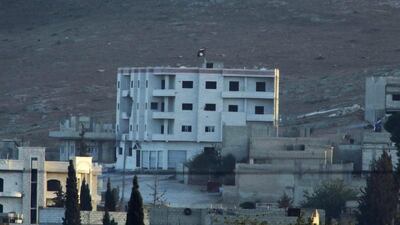MURSITPINAR, TURKEY // ISIL’s black flag was seen flying over the eastern side of Kobani as militants penetrated the key Syrian town on the Turkish border, sparking street-to-street fighting with its Kurdish defenders on Monday after a three-week-long siege, a monitoring group said.
“Urban guerrilla warfare has started and the fighting is taking place for the first time in districts at the eastern entrance to Kobane, in Maqtala Al Jadida and Kani Arabane,” Syrian Observatory for Human Rights head Rami Abdel Rahman said.
“The jihadists and the Kurds are clashing in the streets, between apartment buildings,” sending hundreds of civilians into flight towards the Turkish border, he said.
The advances came after ISIL fighters seized part of Mishtenur Hill, which overlooks Kobani, at the weekend, although US-led air strikes tried to slow the militants.
ISIL has been battling to seize the predominantly Kurdish town after taking over large areas in Syria and Iraq in recent months.
Airstrikes by American and Gulf state warplanes have failed to halt the advance of the Islamists, who have besieged the town from three sides and pounded it with heavy artillery.
More than 2,000 Syrian Kurds were evacuated from Kobani, Mr Ali said.
Mortars have rained down on residential areas in Kobani and stray fire has hit Turkish territory in recent days, but Kurdish pleas for help have so far largely gone unanswered.
ISIL wants to take Kobani to consolidate a dramatic sweep across northern Iraq and Syria.
Beheadings, mass killings and torture have spread fear of the group across the region, with villages emptying at the approach of pickup trucks flying ISIL’s black flag.
But Esmat Al Sheikh, head of the Kobani Defence Authority, said the militants will meet heavy resistance: “We either win or die. We will resist to the end.”
The Britain-based Syrian Observatory for Human Rights and a statement from the YPG said more than 45 fighters on both sides were killed on Sunday near Kobani, including a Kurdish female fighter who blew herself up, killing several ISIL fighters.
Kobani, known in Arabic as Ain Al Arab, and surrounding areas have been under attack since mid-September, with ISIL militants capturing dozens of nearby Kurdish villages.
The assault has forced some 160,000 Syrians to flee and strained Kurdish forces, who have struggled to push back the extremists despite being aided by US-led coalition airstrikes.
On the Turkish side of the border, at least 14 Turkish army tanks took up defensive positions on a hilltop near Kobani. Heavy bombardment could be heard down below as plumes of smoke rose from the town.
About 260 kilometres away from Kobani in Hasakah, at least 30 people were killed in two suicide attacks on two checkpoints run by Kurdish fighters.
The north-eastern province of Hasakah, which borders Iraq and Turkey, has a population of over one million, 70 per cent Kurd and 30 per cent Arab.
Kobani’s Kurds have so far received little help from elsewhere. Turkey has given shelter to the bulk of the area’s refugees, and its doctors have treated the wounded, but it has given no suggestion that it could join the fight, beyond gestures of self-defence.
Over the weekend, president Tayyip Erdogan vowed to retaliate if ISIL attacked Turkish forces.
Some of the Turkish tanks on the border pointed guns towards Syria, apparently in response to stray fire crossing the frontier.
Still, ISIL’s release last month of 46 Turkish hostages, and a parliamentary motion last week renewing a mandate allowing Turkish troops to cross into Syria and Iraq, have raised expectations that Ankara may be planning a more active role. Nato said on Monday it would stand by Turkey if it comes under attack as a result of the fighting in Syria.
“The main responsibility for Nato is to protect all allied countries. Turkey is a Nato ally and our main responsibility is to protect the integrity, the borders of Turkey and that is the reason why we have deployed Patriot missiles in Turkey,” said the alliance’s secretary general Jens Stoltenberg.
Leon Panetta, a former US defence secretary, said the fight against the ISIL will be difficult and could last decades because of decisions made by Barack Obama.
“I think we’re looking at kind of a 30-year war” that could extend to threats in Libya, Nigeria, Somalia and Yemen, Mr Panetta said.
Mr Panetta, a respected policymaker who served under Mr Obama, blamed the challenges on decisions the president made over the past three years.
Among those decisions, he cited Mr Obama’s failure to push the Iraqi government hard enough to allow a residual US force to stay in the country after troops withdrew in 2011, saying that created a security “vacuum”.
* Reuters with additional reporting by Agence France-Presse

